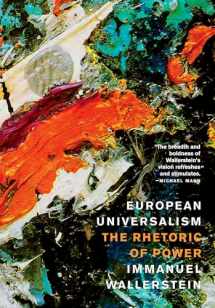
European Universalism: The Rhetoric of Power
ISBN-13:
9781595580610
ISBN-10:
1595580611
Edition:
1
Author:
Immanuel Wallerstein
Publication date:
2006
Publisher:
New Press
Format:
Paperback
128 pages
Category:
Rhetoric
,
Words, Language & Grammar
,
Political
,
Philosophy
,
Sociology
,
Political Science
,
Politics & Government
FREE US shipping
on ALL non-marketplace orders
Marketplace
from $13.87
USD
Marketplace offers
Seller
Condition
Note
Seller
Condition
New
Brand New! Not overstocks! Brand New direct from the publisher! Ships in sturdy cardboard packaging.
Book details
ISBN-13:
9781595580610
ISBN-10:
1595580611
Edition:
1
Author:
Immanuel Wallerstein
Publication date:
2006
Publisher:
New Press
Format:
Paperback
128 pages
Category:
Rhetoric
,
Words, Language & Grammar
,
Political
,
Philosophy
,
Sociology
,
Political Science
,
Politics & Government
Summary
European Universalism: The Rhetoric of Power (ISBN-13: 9781595580610 and ISBN-10: 1595580611), written by authors
Immanuel Wallerstein, was published by New Press in 2006.
With an overall rating of 3.8 stars, it's a notable title among other
Rhetoric
(Words, Language & Grammar , Political, Philosophy, Sociology, Political Science, Politics & Government) books. You can easily purchase or rent European Universalism: The Rhetoric of Power (Paperback) from BooksRun,
along with many other new and used
Rhetoric
books
and textbooks.
And, if you're looking to sell your copy, our current buyback offer is $1.02.
Description
How ideas such as civilization and progress have been used as a smoke screen for western dominance, by the world-renowned sociologist.
Ever since the Enlightenment, Western intervention around the world has been justified by appeals to notions of civilization, development, and progress. The assumption has been that such ideas are universal, encrusted in natural law. But, as Immanuel Wallerstein argues in this short and elegant philippic, these concepts are, in fact, not global. Rather, their genesis is firmly rooted in European thought and their primary function has been to provide justification for powerful states to impose their will against the weak under the smoke screen of what is supposed to be both beneficial to humankind and historically inevitable.
With great acuity Wallerstein draws together discussions of the idea of orientalism, the right to intervene, and the triumph of science over the humanities to explain how strategies designed to promote particular Western interests have acquired an all-inclusive patina.
Wallerstein concludes by advocating a true universalism that will allow critical appraisal of all justifications for intervention by the powerful against the weak. At a time when such intervention—in the name of democracy and human rights—has returned to the center stage of world politics, his treatise is both relevant and compelling.
Ever since the Enlightenment, Western intervention around the world has been justified by appeals to notions of civilization, development, and progress. The assumption has been that such ideas are universal, encrusted in natural law. But, as Immanuel Wallerstein argues in this short and elegant philippic, these concepts are, in fact, not global. Rather, their genesis is firmly rooted in European thought and their primary function has been to provide justification for powerful states to impose their will against the weak under the smoke screen of what is supposed to be both beneficial to humankind and historically inevitable.
With great acuity Wallerstein draws together discussions of the idea of orientalism, the right to intervene, and the triumph of science over the humanities to explain how strategies designed to promote particular Western interests have acquired an all-inclusive patina.
Wallerstein concludes by advocating a true universalism that will allow critical appraisal of all justifications for intervention by the powerful against the weak. At a time when such intervention—in the name of democracy and human rights—has returned to the center stage of world politics, his treatise is both relevant and compelling.


We would LOVE it if you could help us and other readers by reviewing the book
Book review

Congratulations! We have received your book review.
{user}
{createdAt}
by {truncated_author}


